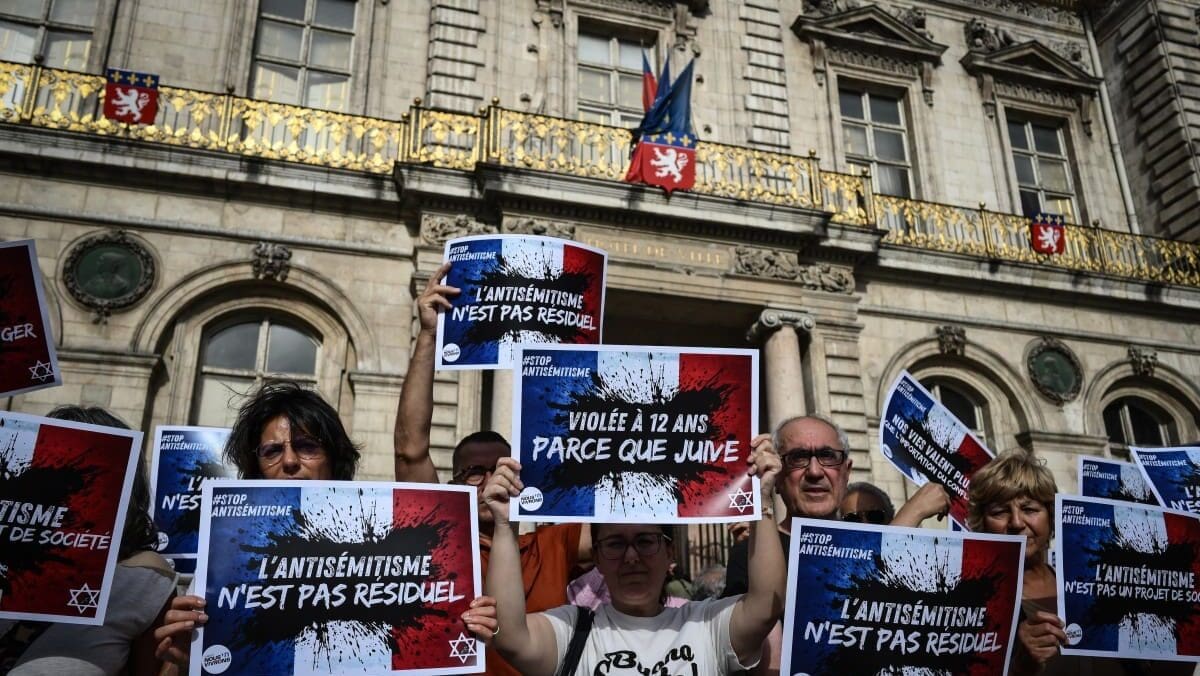
Protesters hold placards which read “Anti-Semitism is not residual”, “+1000% in anti-Semitic acts, these aren’t just figures”, “Our lives are worth more than the imported conflict” and “Raped Jewish girl, Republic in danger” as they gather to condemn the alleged antisemitic gang rape of a 12-year-old girl, during a rally on Lyon Terreaux square in Lyon, central eastern France, on June 19, 2024.
Photo: JEAN-PHILIPPE KSIAZEK / AFP
Less than two weeks before the first round of parliamentary elections, a new tragedy of exceptional violence has shaken the French: the rape―accompanied by death threats, beatings, and injuries―of a 12-year-old girl by three minors, on the grounds that she was Jewish.
These horrendous events took place on Saturday, June 15th in Courbevoie—a rather quiet suburb to the north-west of Paris. The assailants were particularly young. Two of them, aged 13, were indicted on Tuesday, June 18th for the gang rape of a 12-year-old girl involving “violence, death threats, and antisemitic insults,” while the third, aged just 12, was placed under witness protection for the rape.
While playing with a friend in a park near her parents’ home, the young victim was dragged by two boys into a disused building, where a third boy was waiting. There, the three assailants began a full-scale interrogation of the teenager, punctuated by blows and the threat of burns from a lighter—all of which was photographed by one of the boys. She was called a “bloody Jew” (sale Juive) and asked questions “about Israel and her Jewish religion,” which she was accused of “hiding.”
According to the account she later gave to the police, the three boys then attacked her, gang-raping her, and threatening to kill her if she spoke to the police. Her ordeal lasted two hours. Still threatening to kill her and her parents, they arranged to meet her the next day and asked her to bring €200. On her return home, traumatised, the child was able to tell her parents what had happened. They immediately informed the police. The assailants were easily identified thanks to the presence of surveillance cameras in the area and were arrested on Monday.
The brutality of the offences is exceptional given the youth of the accused, who have so far expressed “regret” for the victim, without going into their involvement in the acts of which they are accused.
In a politically charged context―the run-up to the first round of snap parliamentary elections―political emotions are running high, especially given the alleged antisemitic nature of the attack. The theme of antisemitism is very present in the campaign, on both the Right and the Left. The left-wing alliance of the New Popular Front is accused by the centre and the Right of guilty complacency towards antisemitism of Muslim origin, rampant in the French suburbs.
In contrast, the demonstrations organised against the ‘far right’ since the elections were announced have taken place against a backdrop of pro-Palestinian agitation. In Courbevoie, the commune’s Les Républicains (LR) mayor Jacques Kossowski points to the obvious responsibility of the far left in the deteriorating climate affecting French Jews. “As far as antisemitism is concerned, I’m sorry to say it, but when you see the European election campaign, it doesn’t help matters,” said the mayor, targeting in particular the France Insoumise (LFI) party and its pro-Palestinian activism. LFI leader Jean-Luc Mélenchon recently declared that antisemitism was only “residual” in France.
For Marine Le Pen, the Left’s responsibility for the rise in antisemitism is self-evident. “The antisemitic attack and rape of a 12-year-old child in the Hauts-de-Seine department appalled us,” she was quoted as saying by Le Figaro, going on to criticise
the stigmatisation of Jews for months by the far left through the instrumentalisation of the Israeli-Palestinian conflict.
“Everyone should be fully aware of this on June 30th and July 7th,” she added.
The Left accuses the Rassemblement National (RN) of searching for redemption by defending the Jews of France, contrary to the allegedly antisemitic past of the party and its previous leaders. It is nonetheless true that today, French Jews are turning significantly towards the right-wing parties Reconquête—Éric Zemmour’s party—and the RN. Within the Jewish community, the arrival of the far left allied with the Left in power is increasingly perceived as a danger: according to a recent poll, 92% of French Jews blame La France Insoumise for the rise in antisemitism in France.
The reaction of the President of the Republic seems lacklustre: on Wednesday, June 19th, Emmanuel Macron proposed to the Council of Ministers the organisation of a “discussion time” in schools on racism and antisemitism—though this kind of measure has proved totally inefficient in the past. That same evening, a demonstration against antisemitism was organised in Paris, attended by Justice Minister Éric Dupont-Moretti, who condemned antisemitism and declared it anything but “residual.”
